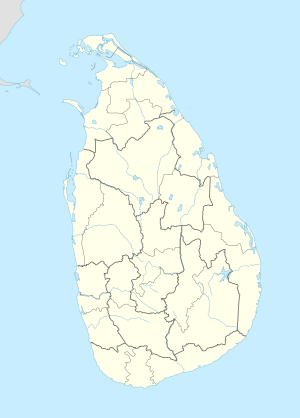Kurukkalmadam massacre
| Kurukkalmadam massacre | |
|---|---|
| Location | Kurukkalmadam, Batticaloa, Sri Lanka |
| Date | 13 July 1990 |
| Target | Sri Lankan Muslims |
Attack type | Armed massacre |
| Deaths | 60-168[1][2][3] |
| Perpetrators | Liberation Tigers of Tamil Eelam |
The Kurukkalmadam massacre was a massacre of Sri Lankan Muslims in Kurukkalmadam by the Liberation Tigers of Tamil Eelam (LTTE). The number of casualties is estimated to be 60-168.[1][2]
Background[edit]
Following the breakdown of the June 1990 peace talks, Tamil-Muslim relations in the Eastern Province deteriorated rapidly. Many Muslims in the East took a pro-army stance in the war. Some acted as informants for the army, identifying LTTE hideouts and LTTE supporters.[4] A cycle of tit-for-tat violence between the LTTE and Muslim Home Guards emerged, leading to the massacres of civilians on both sides.
Incident[edit]
Muslim travellers from Kattankudy and Colombo in vehicles, including Hajj pilgrims, were stopped by the LTTE near Kurukkalmadam.[5] Some Muslims were removed from the vehicles but others were allowed to return, allegedly so that they could inform other Muslims about what was happening at Kurukkalmadam. The LTTE supposedly picked which Muslims should live and which should die at random.[6] 35 Muslim bus passengers were shot dead by the LTTE.[7] The LTTE, at first, seemed to only be interested in holding the rest for ransom. However, at some point, the LTTE decided to kill them. The Muslim captives, including seniors and children, were hacked to death and their corpses were burnt.
Various explanations for the decision to massacre exist. One theory is that the LTTE was appealing to the anti-Muslim sentiment among Tamil refugees in the east who saw the Muslims as complicit in government atrocities against Tamils. Tamil villagers in Kurukkalmadam suspected that the LTTE's motive for the massacre was to draw negative army attention towards the villagers.[1][2] Muslim residents of Kalmunai, on the other hand, saw the massacre as a way to warn Muslims against identifying LTTE hideouts for the Sri Lankan Army.[8]
In response to the massacre, Muslim leaders sought the intervention of the Roman Catholic Church.[9]
Mass grave[edit]
Families of the deceased alleged that the bodies of the massacred are in a mass grave at Kaluwanchikudy. In 2014, 66 relatives of the victims requested that the skeletons be exhumed from the mass grave to allow them to give the deceased proper burials. The Kaluwanchikudy court ordered an exhumation and asked the office of the Chief Judicial Medical Officer (Colombo) to carry it out. The Justice Ministry was contacted by the office for funding for experts for a length of time but never responded.[10]
References[edit]
- ^ a b c The Clash of Ideologies and the Continuing Tragedy in the Batticaloa & Amparai Districts (Report). University Teachers for Human Rights (Jaffna). 8 May 1991.
- ^ a b c Human Rights in Sri Lanka: An Update (PDF) (Report). Human Rights Watch. 12 March 1991.
- ^ Sugeeswara, Senadhira (20 July 1990). "Premadasa Warns on Interfering". India Abroad. ProQuest 362654489. Retrieved 18 December 2022.
- ^ Menon, Ramesh (15 September 1990). "LTTE suspected behind massacre of Muslims in Sri Lanka". India Today. Retrieved 18 September 2022.
- ^ Haniffa, Farzana (8 July 2010). Manchanda, Rita (ed.). States in Conflict with Their Minorities: Challenges to Minority Rights in South Asia. SAGE Publications Ltd. p. 268. ISBN 9788132105985. Retrieved 24 December 2022.
- ^ Ruwanpathirana, Thyagi (7 August 2014). "Where have all the young men gone?". Groundviews. Retrieved 17 September 2022.
- ^ "Sri Lanka Rebels Said to Kill 35 Muslim Bus Passengers". New York Times. Associated Press. 15 July 1990. Retrieved 24 December 2022.
- ^ "SRI LANKA : 35 Muslims on Buses Reportedly Slain". Los Angeles Times. 15 July 1990. Retrieved 24 December 2022.
- ^ The Debasement of Law and of Humanity and the Drift Towards Total War (Report). University Teachers for Human Rights (Jaffna). 28 August 1991.
- ^ Wijedasa, Namini (6 January 2019). "Mass graves: The dead tell a tragic tale of delays and disputes". The Sunday Times. Retrieved 17 September 2022.

